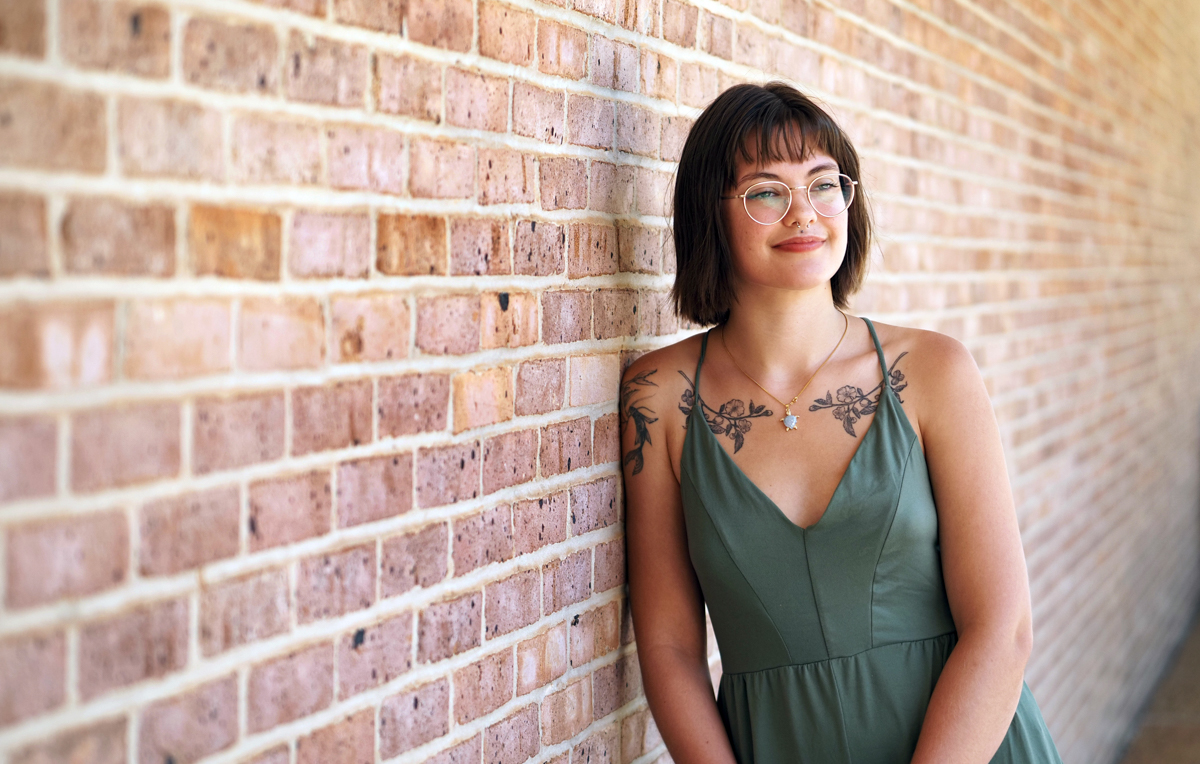Galapagos Geography
Posted on May 2, 2023 by Thomas Becnel

Jade Martin chose a geography major at the University of South Alabama because she wanted to see the world and study the relationships between people and their environments.
For SURF – a Summer Undergraduate Research Fellowship – she examined the role of climate change in the “Dead Zone” of low oxygen and marine life off the Louisiana Gulf Coast. During her junior year, she did a Study Abroad program in Germany.
In the final semester of her senior year, Martin joined Dr. Steven Schultze, a climatologist and associate professor of geography, on a research trip to the Galapagos Islands, one of the most remote and unique ecosystems on the planet.
“That was one of my dream places to visit,” she said. “It was confirmed in January-February and we went during spring break, the first week in March.”

Martin got to see the giant tortoises of the Galapagos. She got to snorkel among sea lions and hammerhead sharks. And she got to help Schultze with their main task on San Cristobal Island.
They spent a day installing a network of beehive-shaped sensors to compare microclimates in different locations and altitudes. The devices record temperature, humidity and dew point at one-minute intervals.
South has a partnership with the Galapagos Science Center and the Universidad San Francisco de Quito in Ecuador. Schultze has spent several years developing the micronet for research.
“The data it will generate is foundational for fields like climatology, biology, geography, and ecology, and we expect a significant amount of buzz around papers and grants generated by it,” he said. “Jade, who plans to go to grad school someday, was part of every aspect of the research from planning to execution to data analysis.”
When she took classes with Schultze, he was impressed with her curiosity, scholarship and dedication. That’s how she became a research assistant and partner in some projects.
“What sets her apart is her drive, her willingness to go the extra mile – sometimes, literally, all the way to Germany or the Galapagos Islands,” Schultze said. “She’s one of those people, she’s ready to go, and she can see we offer that opportunity.”
After returning to Mobile from the Galapagos, Martin used maps, photos and GIS, Geographic Information Science, to create a StoryMap of her research trip. The study of physical geography at South includes a great deal of tech work.
“When you think about geography, GIS is the application side,” she said. “It’s very computer-heavy, software-based. Basically, we can take in any kind of imagery, any kind of topographic data, and we can analyze it, manipulate it and display it in a variety of ways.
“The technology, especially with satellites and drones, is becoming a big part of GIS. That’s another thing I love about geography. It’s always changing. There’s always something new.”
Baykeeper and Beyond
Martin grew up north of Birmingham in the small town of Warrior, Alabama. She jokes that this explains her passion for travel.
In school, she thought about becoming a meteorologist or a veterinarian.
“It was always something in science, though,” Martin said. “I asked a lot of questions as a kid. Science gave me a chance to get some answers.”
After high school graduation, she toured Mobile and then enrolled at South.
“I’d never really been down here before,” she said. “It was not too close and not too far from home. It felt right.”
Martin is a vegetarian who shops at thrift stores and has a tattoo of a tea plant, camellia sinensis, across her shoulder. She drives a 2007 Volvo that lacks one important feature.
“No AC – the air conditioning’s gone,” she said, laughing. “Mobile summers are rough.”
During COVID, she moved home and worked full-time while taking remote classes. Her schedule included 12-hour shifts at an Amazon delivery center in Bessemer, Alabama. That was rough, too.
In Mobile, Martin works part-time with the Mobile Baykeeper organization. She’s an AmeriCorps team member who samples water quality in Mobile and Baldwin counties.
Her senior thesis compares bacteria levels in bodies of water before and after a Clean Water Act lawsuit in 2017. That project was another learning experience.
“Research doesn’t always go as planned,” she said. “Finding historical water quality data can be difficult, but I think I did well with what I had.”
Recently, Martin accepted a job as an environmental scientist with an engineering firm in Gulfport, Mississippi. She’ll be doing wetlands inspections, environmental assessments and GIS work.
This summer, she’ll also complete her work with Mobile Baykeeper. Her schedule also includes a surprise return trip to the Galapagos Islands.
A once-in-a-lifetime trip has turned into a twice-in-a-lifetime opportunity. Martin will join Schultze at a Galapagos research symposium in late June. This visit will offer a different perspective.
“We just found out about it,” she said, excited, “so now we’re going back. This time, we’ll go to the main island, Isabela, so I’ll see penguins and volcanoes and everything in between.”


